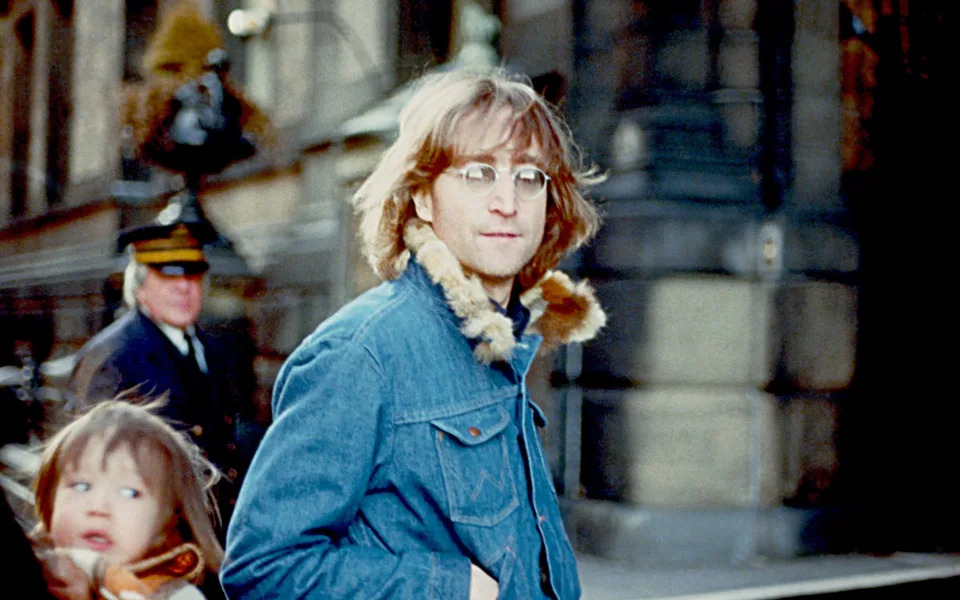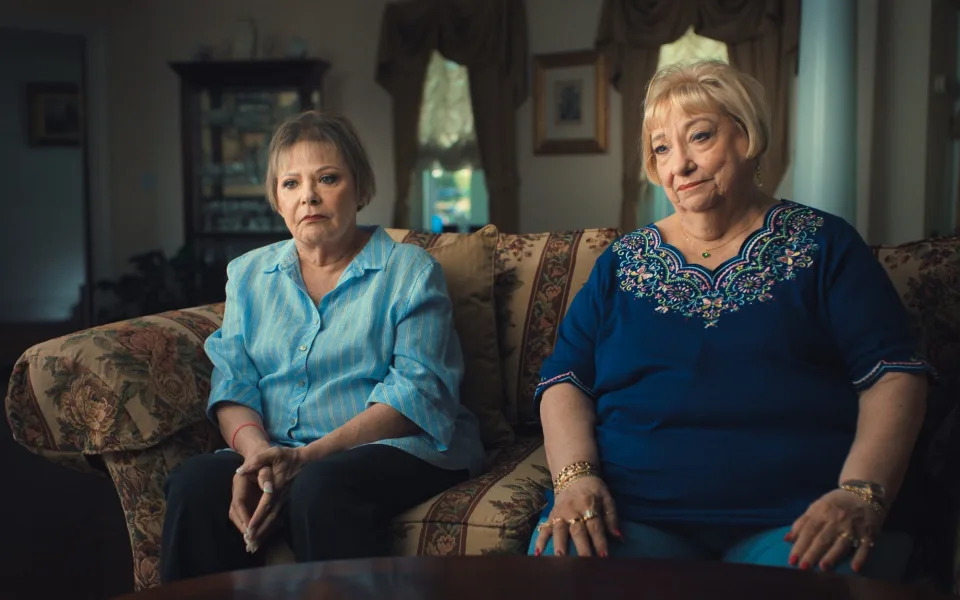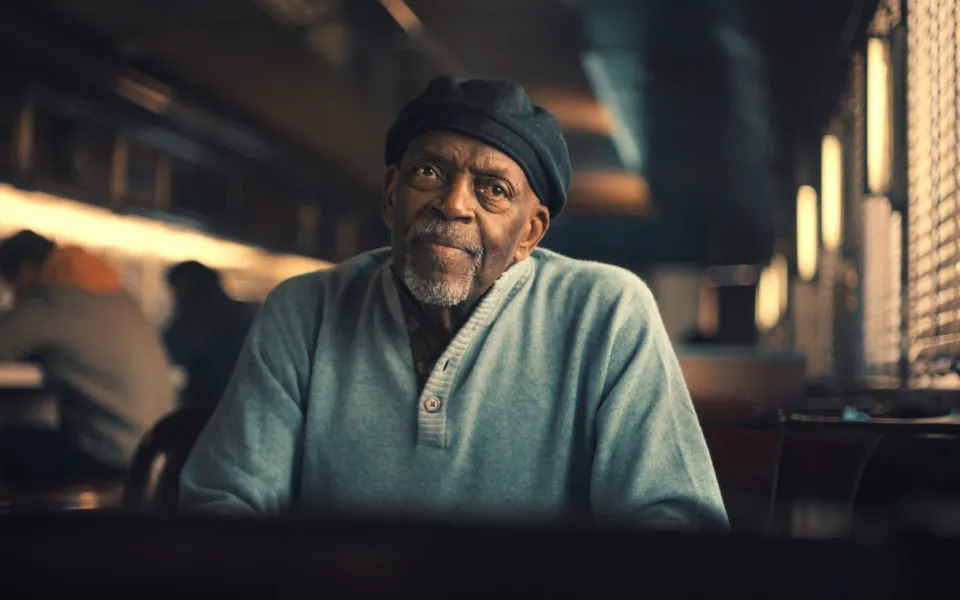Anita Singh
Sat, 2 December 2023

John Lennon with his son Sean in 1977 - Vinnie Zuffante/Archive Photos
Everyone over the age of 50 remembers where they were when they heard the news that John Lennon had been shot. For a handful of people, that day remains horribly vivid because they were there. The concierge and porter of the Dakota building, the first police officers on the scene, and the doctor and nurses who tended to a dying Lennon at the Roosevelt Hospital all present their recollections in John Lennon: Murder Without a Trial (Apple TV+).
It is remarkable to listen to these first-hand accounts, so vivid and detailed despite the passage of more than 40 years. There is a danger that documentaries like these can be little more than true-crime titillation, but here there is a sense that those present wanted history to be recorded. The concierge, Jay Hastings, has never spoken publicly before. Asked why he is doing so now, he replies: “Time’s passed. We’re on the record. Once and done.” Also speaking on-camera for the first time are Richard Peterson, a cab driver who witnessed the shooting, and Dr Naomi Goldstein, the psychiatrist who assessed shooter Mark Chapman.
Other contributors to the first episode include two police officers who were first on the scene and the doctor who spent 45 minutes massaging Lennon’s heart before accepting that it was futile. The documentary takes us minute by minute through that night, and the witnesses describe their moment of realisation that this gunshot victim was one of the most famous men in the world. “It hit me,” says one of the cops, as he remembers kneeling down to check for a pulse. “I said, ‘Holy smokes, this is John Lennon’.”
The three-part documentary, narrated by Kiefer Sutherland, weaves in archive footage and news coverage of the case, which helps to illustrate the huge impact of this story back in 1980. Episode two focuses on the police investigation and episode three on the trial, and the focus in both of these is Chapman. The programme weighs up whether he was legally insane, as his defence claimed. His former lawyer and the lead detective on the case argue both sides. And we hear from Chapman himself, in previously unheard recordings made in prison, giving various explanations as to why he did it.
The list of contributors is impressive and the researchers have done a sterling job, although it is never explained if Yoko Ono was asked or declined to appear. There is one count on which the documentary feels on shaky ground; its toying with conspiracy theories. It is legitimate to mention these, and it is a fact that the FBI considered Lennon to be a threat due to his anti-war stance.
The theory that Chapman had been under the influence of MK-Ultra mind control has been around for decades. But the way these things are addressed – and conspiracy is trailed in the opening minutes – adds a slightly sensationalist tone, and the theories are soon cast aside without thought.
Witnesses to John Lennon’s murder speak for first time
Anita Singh
Sat, 2 December 2023
John Lennon’s last words have been disclosed in a new documentary which also features a recording of Mark Chapman discussing his motive.
The series, John Lennon: Murder Without A Trial, includes interviews with witnesses to the shooting on 8 December 1980 and its aftermath, and looks at the conspiracy theories that sprung up.
The concierge of Manhattan’s Dakota building, where Lennon was shot as he returned home, speaks publicly about that night for the first time and says the former Beatle said, “I’m shot,” before collapsing. In another first, audio recordings of Mark Chapman speaking to his lawyers as he awaited trial are heard.
Asked by his legal team why he shot Lennon, Chapman refers to the Beatles song when he says, ‘All You Need Is Love, have you ever heard that? Well, this is what I say to that: all you need is love and 250 million dollars. He was the biggest, phoniest bastard that ever lived.”

Barbara Kammerer and Deartra Sato, first responder nurses to Lennon - CHP
The first police responders on the scene also speak to the documentary, along with the doctor who treated Lennon at the Roosevelt Hospital and the nurse who broke the news of the star’s death to his wife, Yoko Ono.
The title of the series refers to the fact that Chapman pleaded guilty to second-degree murder on the eve of his trial. He was sentenced to at least 20 years in prison and has repeatedly been denied parole.
The series director, Nick Holt, said: “I felt that a lot of people directly involved in the case were getting on a bit now and if we didn’t capture and gather them into a series, their testimony would be lost forever.”
The producer
Lennon spent his final hours at a recording studio where he had begun work on a new single. Jack Douglas, his producer, tells the documentary: “He was on top of the world. The last I saw of him was getting in the elevator. As the elevator door was closing, he was standing right in front of me with this big smile. He was so happy about how everything was going. It had been a glorious day and he just said to me, ‘I’ll see you in the morning, 8am.’ Happy as a lark.”
The taxi driver
Cab driver Richard Peterson was parked outside the Dakota and witnessed the shooting. “Lennon was walking in and this kid says, ‘John Lennon.’ He was a chunky guy. I’m looking at him through the front window of my cab. I’m looking at him shoot him. This guy just shot John Lennon.
“I thought they were making a movie, but I didn’t see no lights or cameras or anything so I realised, hey, this ain’t no movie.”
The concierge
Jay Hastings, who worked on the front desk at the Dakota building, heard Lennon’s last words. “He runs past me. He goes, ‘I’m shot.’ He had blood coming out of his mouth. He just collapsed on the floor. I half rolled him to his back and took his glasses off, put them on the desk. And Yoko was screaming, ‘Get an ambulance, get an ambulance, get an ambulance.’”
The police officers
NYPD officer Peter Cullen arrested Chapman, who had remained at the scene clutching a copy of The Catcher In The Rye. “We put the cuffs on him and it was strange: there was no resistance at all. He actually apologised to us. He said, ‘Gee, I’m sorry you guys, I ruined your night.’ I says, ‘You gotta be kidding me. You know you just ruined your whole life?’”
Herb Frauenberger, another NYPD officer, tended to Lennon: “Somebody is yelling, ‘There’s a guy shot back here.’ So we go in and the first thing I see is a man laying on the floor. I turned his head just a little bit so I could try to feel for his pulse, and he had a very faint pulse… and then it hit me. I said, ‘Holy smokes, this is John Lennon.’”
The medical staff
Dr David Halleran treated Lennon when he was rushed into the emergency room at Roosevelt Hospital. “I go running down there and they say, ‘We have a gunshot wound.’ We’re working on him, pumping his heart, and it’s like, ‘My God, that is John Lennon.’
“Your hands are on the heart and you’re squeezing it - just keep pumping. The hope is that you get some flicker of life and unfortunately it was just not enough. I think the total time was about 45 minutes before it became futile and we called it and stopped… You feel like you failed.”

Richard Peterson, taxi driver, in John Lennon: Murder Without A Trial - CHP
Barbara Kammerer, a nurse, went to break the news to Ono: “She knelt down and I knelt down next to her. She had her arms around me and I kept reiterating that he wasn’t in pain, he was not scared. Then Yoko said, ‘I have to get home. I have to see my son.’ She did not want him to hear it on the radio or TV.”
As staff walked out of the room where Lennon lay dead, another nurse says, the ‘muzak’ playing over the hospital system was ‘Imagine.’
The family friend
Elliot Mintz visited Yoko the day after the shooting. He recalled: “Yoko was barely there. She stared at the television for a while; although the sound was off it was only showing one thing over and over and over again. We heard the singing [by fans who had gathered on the street below]. Although we were on the top floor we heard it very very clearly. And then she looked at me and said, ‘Why would that man do that?’
“I’ve never expressed this before, [but] one of the things that Yoko asked me was to look into the various theories, the conspiracy theories, after John’s murder. The two of them were convinced that their apartment was being bugged.”
The psychiatrist
Dr Naomi Goldstein was tasked with assessing Chapman’s sanity and ability to stand trial. She said: “He showed so many different facades - he could be nasty, he could be sweet, he was difficult. He tried to avoid giving straight answers.” But she said that “nothing remotely psychotic came out of him, no evidence of hallucinations or delusions,” and concluded that he was fit to stand trial.”
The lawyer
David Suggs, one of Chapman’s lawyers, maintains that he was legally insane. “It was weird because you could talk to him at times and he would seem pretty normal and then, wham, out of his mouth in the next instant would come something that was just so out of left-field you realised, ‘Oh, yeah, he’s crazy.’”
The audio recording
The documentary includes tapes of Chapman explaining his actions to his legal team. In one, he says: “Well, this is kind of a crazy thought but I thought I would turn into somebody if I killed somebody… you know that book [JD Salinger’s] The Catcher In The Rye? I had that book on me and I thought I would turn into the character in the book… Holden Caulfield… It is my sincere belief that I killed John Lennon to get as many people as possible to read The Catcher in the Rye.”
Later he uses Caulfield’s favourite criticism - “phoniness” - when he says: “Here’s what I say about John Lennon. ‘All you need is love’, have you ever heard that? Well, this is what I say to that: all you need is love and 250 million dollars. He was the biggest, phoniest bastard that ever lived. I wasn’t about to let the world endure 10 more years of his menagerie of bull—-.”
The pastor
Charles McGoan, a pastor at Chapman’s church, still visits him in prison. He said: “He’s paid a bigger penalty than a lot of people realise because he’s having to live in isolation in prison. He can’t even go to chapel services because of fear of harm to him from other prisoners. If he’d shot somebody who wasn’t famous, I don’t think he’d be in prison today. He shot the wrong man.”
No comments:
Post a Comment